- Home
- Margaret Mahy
The Riddle of the Frozen Phantom
The Riddle of the Frozen Phantom Read online
The Riddle of the Frozen Phantom
Margaret Mahy
Illustrated by Chris Mould
Contents
Cover
Title Page
1. At the Very Back of the Drawer
2. A Strange Awakening
3. The First Listener
4. The Second Cry for Help
5. The Third Cry of Help
6. On the Trampoline
7. Mukluk Kissing
8. Two Different Careers
9. The Treachery of a Housekeeper
10. A Startling Idea for a Devoted Father
11. Unexpected Air Travel
12. Wicked Plans in Black Planes
13. Getting There
14. A Skiddoo is Stolen
15. Off and Away at Last
16. A Ghost with Problems
17. The End of the Road
18. Up in the Air
19. Ghostly Horror
20. Penguins and Ghosts
21. Whoops!
22. Smotheration by Snow
23. The Captain Waits
24. Sophie Believes the Pendant
25. Who Goes Next?
26. The Riddle at Last
27. Villains Can’t Trust Other Villains
28. The Logbook at Last
29. Antarctic Wishes
Keep Reading
Also by the Author
Copyright
About the Publisher
CHAPTER 1
At the Very Back of the Drawer
Suddenly, something clonked softly at the back of the empty drawer.
Sophie Sapwood, sitting in a sea of old photographs, stopped listening to her brothers who were outside, shouting and whistling as they bounced on the family trampoline. She tuned in to the back of the drawer instead.
She had been planning to go out to the trampoline herself, just to show both brothers the best way to turn somersaults in the air. After all, she had already found what she had been searching for – photographs of their dead mother which she had studied carefully. There was nothing left to look for. The drawer was completely empty.
But it wasn’t! It couldn’t be! Somewhere at the very back of the drawer, somewhere behind that first empty openness, something had clonked softly Sophie tugged at the drawer, trying to pull it right out, but it remained obstinately jammed halfway. Reaching in once more, her searching fingers spidered left, then spidered right. Nothing! But then, by flattening her arm, Sophie managed to reach just a little further and her fingertips brushed something smooth. Whatever it was was also icy cold, which was unexpected on such a warm morning. After all, here in New Zealand it was nearly midsummer – nearly Christmas.
The night before, Sophie had dreamed about her mother. She had woken and lain in bed for a few minutes without actually opening her eyes while she tried to work out if her mother had really looked like the mother in the dream. It had bothered Sophie to find that, though she could remember her mother’s voice, though she could remember the songs she had sung and her way of laughing, she was no longer sure about the colour of her hair, or the shape of her nose. That was why she had sneaked upstairs, all on her own, to sort through the bottom drawer in an old forgotten chest of drawers, boxed in by family junk at the back of the upstairs spare room. This drawer was crammed with photographs – some of Sophie’s mother, some of her big brother, Edward, and her little brother, Hotspur, and some of Sophie herself. Most of the photographs, however, showed icebergs, distant mountains and her father, the famous Antarctic explorer, Bonniface Sapwood, proudly posing beside sledges, flags and whole parties of penguins. There were even one or two photographs of the redheaded penguin-expert Corona Wottley, who had been part of an exploring expedition Bonniface had organised several years ago.
Sophie had patiently worked her way right through that jam-packed, higgelty-piggelty, mishmash of Antarctic photographs until she had entirely emptied the drawer… or at least, she thought she had. Yet here she was, touching this clicking, cold shape; this whatever-it-was which must have been left and lost for years and years. Scrabbling busily, she got a grip on it. Gently, she drew it out into the light of day.
Dangling from her dusty fingers was a yellowish-white pendant – a milky tear carved from a bone. Whalebone, perhaps, thought Sophie. It was threaded on a thin strip of leather rather like a long bootlace. The greenish light, filtering through the ivy that half-covered the upstairs window, seemed to love this pendant, stroking it, then sinking into it. Sophie loved it too – loved it so much that she immediately hung it around her neck and then, leaping across the room, stared at herself in the dusty mirror above the old dressing table.
How strange! The pendant had changed her. She had suddenly become a girl with a secret. She touched it wonderingly. It must have been shut up in the drawer for years and years, and during that time no one had worn it or warmed it or wanted it. It’s meant for me, thought Sophie. Even though Christmas was a whole five days away she felt that the house had given her a sort of early Christmas present. “It’s meant for me,” she repeated aloud, and nobody argued or contradicted her. However, just to be on the safe side, she slipped the pendant down under her T-shirt. For some reason she felt certain that, although it wanted to be worn, it also wanted to be hidden. Perhaps there was something it needed to hide from.
As it slid down over her heart, stroking her warm skin, Sophie gasped, for it still felt as cold as – no! even colder than ice! She clapped both hands against her chest as if she were in pain. But within a second or two the pendant began to feel a little less cold. Sophie’s skin was working on it.
Aha! I’m the boss! thought Sophie, and began packing photographs back into the drawer, but neatly this time. She looked at the photographs of her mother all over again.
We do look alike, she thought. That means she’s still here in a way I’m watching the world for both of us. And this thought made her happy.
She leaped up, made for the door and pounded down the stairs on her way out to play with her brothers on the family trampoline.
There was no way that Sophie could have known as she hopped from one step to another, with the pendant slowly warming up against her skin, that far away in a lost part of the wild Antarctic coast, a pair of eyes that had been closed for a long, long time were opening. Someone – someone who had not moved for the last seventy years – had begun to stir.
CHAPTER 2
A Strange Awakening
“Cold!” that someone muttered, hugging himself. “I’m so cold!”
Although he was in a cold place, it wasn’t the cold around him he was feeling. The cold about which he was complaining seemed to be welling out of his very heart. At first that was the only thing he really knew. He certainly wasn’t sure who he was or even what he was (though a lot of people feel like this when they wake from deep sleep). He struggled to open his eyes properly and, at long last, he did open them, looking out into a deep and ancient darkness stained with strange blue light. When he turned his head, this light turned too, as if it were somehow watching him. And horrakapotchkin! What was that directly above him? Long teeth, preparing to bite him in two? The fangs of a ferocious beast?
Frozen with cold! Frozen with terror! the waking man thought. But is the world freezing me or am I freezing the world?
But the faint blue light seemed to be soaking into those teeth. Of course! They were not really teeth. They were icicles. The man took a deep breath.
“Who am I?” he asked aloud. “Where am I? What am I doing here? And why?” He shook some of these questions out of his spinning head. “Pull yourself together!” he told himself sternly. “One thing at a time! Now! Who am I? I am… I am!…”
>
“The Captain!” said a voice in his head – his own voice. “You are the Captain!”
“Right!” he said aloud. “I remember now! I am the Captain! Well, if I’m the Captain I should be up and doing, not lying around in the dark.” And, flattening himself, he began sliding out from under those glassy teeth. To his amazement, he felt, as he wriggled and slid, that he was much lighter than he had somehow imagined he would be. Indeed, it was as if he weighed nothing at all. This unexpected lightness unbalanced him. He wobbled! He swung one arm into the air. Immediately, the longest tooth of ice plunged greedily into it. The Captain screwed up his eyes, expecting blood and pain, but there was no blood, and no pain either. He lowered his arm and the glassy tooth slid out of it without leaving a single mark even on the sleeve of his heavy jacket. Flattening himself once more, he wriggled out from under the toothy icicles, swung his legs sideways, stood up carefully and looked out into the darkness.
The strange blue glow was slowly eating into the shadows around him. It seemed to be coming from him, seeping out of the folds and wrinkles of his clothes. And suddenly the Captain knew exactly where he was. He had been lying on his very own bunk, in his very own cabin, on his very own ship – the gallant Riddle.
His fingers, muffled in three pairs of fine woollen gloves, crept across the fur collar of his great jacket. Horrakapotchkin! His ears had disappeared. But then he realised he was wearing his balaclava and two knitted hats, and that his ears were tucked quite safely beneath them. He fingered the high collar of his natural wool jersey and below that his shirt, the top of his long johns and then not just one but three layers of underwear. He was searching for his whalebone good-luck charm – a charm he had carved and polished himself during his very first Antarctic winter night, back before he rose to the rank of captain. He had shared many adventures with that charm and believed it had carried him safely through many dangers.
“Where’s my pendant?” he asked aloud. The sound of his own echoing voice frightened him. “Hang on! You’re going too fast!” he told himself in a stern whisper. “Begin again! Now, I’m the captain. Right! I’m in my cabin. Right! There’s my captain’s desk! What’s that lumpy thing sitting on it? Oh, it must be the ship’s logbook. But what’s happened to it? Oh, I see! It’s covered with ice. And it’s very thick ice. I must have been asleep for ages.” He puzzled for a moment, then shrugged and went on. “Never mind! What really matters is that my memory is rushing back safe and sound from wherever it has been.”
But this was where the Captain’s memory stopped rushing back. He found he had absolutely no idea of where in the Antarctic The Riddle might happen to be. “Look around!” he told himself sternly. “Work it out!” So he peered this way and that into the gloom, noticing there was ice underfoot and ice overhead, and at last he stood up and made for the cabin door which he tried to open. The blueish light moved with him.
But the door was iced shut. Why, he could not even turn the door handle! The Captain pushed hard. Nothing moved. He put his shoulder to the door and tried to jolt it open with good old-fashioned sailor-power.
Almost at once, he found himself standing on the other side of the door, looking back at it in surprise. Had it opened? No! Somehow, he seemed to have gone straight through it, ice and all. Odd! Very odd! He thumped it experimentally Bang! It seemed quite solid. He thumped harder and this time his hand sank deep into the ice and wood. The Captain pulled his hand free and frowned down at his faintly glowing, gloved fingers.
He shrugged. “Perhaps all doors are like that,” he murmured (though deep down he knew they weren’t). “I might have forgotten,” (though deep down he knew he hadn’t). “I’ve been fast asleep, and now it’s taking me a minute or two to remember the way things ought to be.”
Ahead he saw faint, blueish light coming down the companionway. Where were his officers? Where was his crew? Above all, where was his old friend, the First Mate, Escher Black? There wasn’t even the smallest cabin boy in sight. “All hands aft!” he shouted, just in case, but no one joined in with a cheery. “Aye aye, Sir!” He tried again. “Escher! Escher Black! Heave to, Escher!”
Silence!
“I’ve lost my pendant and I’ve lost my memory. I’ve lost my ship’s crew and I’ve lost my best friend,” he said to himself, climbing the companionway. “Something terrible must have happened for Escher Black would never desert me. But I mustn’t waste time worrying. I must remember! Now! Why does The Riddle look so strange? I do know ships don’t usually look like this. It really is a riddle.”
For the ship seemed hung about with frozen sails and veils of ice. Ice curved all the way around The Riddle. Ice arched over it, masts and all. I’m in a cave, thought the Captain (looking high, looking low as he worked things out). So he was.
The cave was dim, but not quite dark. Light, rather like the light that was still seeping out of the Captain himself, was finding its way through cracks and twisting shafts in the white, glittering roof. It was beautiful but very puzzling.
A slanting bridge, swollen with ice, connected the icy ship to the frozen land. That must be the gangplank, thought the Captain. I’ll just slither down it, walk off a little way and look back at The Riddle. If I put a bit of distance between me and the ship – if I look back at it – I might get some clues.
But he couldn’t walk down that gangplank. It wasn’t just the iciness of it. He couldn’t so much as set foot on it. Whenever he tried, the air seemed to thicken and freeze in front of him. Try as he might, he could not take a single step away from The Riddle.
Suddenly, the Captain understood! He wasn’t an ordinary captain any more. He was a ghost captain… a phantom… a spook! He wasn’t living on The Riddle (wherever it might happen to be), he was haunting it. He must be dead.
Just for a moment the Captain was terrified.
“Help!” he cried aloud. His ghost voice sprang away from him like a salt sea breeze. It swirled around the cave then shot off towards the bright, outside world. “Help! Help! Help!” the Captain cried three times. “Help! Help! Help!” went the echoes, on and on, up into the overhead tunnels through which the light was seeping into the cave, and out into the unknown space beyond.
The captain heard his own echoes fly outwards and upwards, but there was no reply. He was all alone, haunting a lost ship, in an unknown cave, somewhere in a desert of ice. He would have wept with despair if he hadn’t been the ghost of a particularly brave man.
What he did not know was that his three cries for help were already flying at great speed through the outside world, every one of them determined to find the right listener.
CHAPTER 3
The First Listener
“Help!” went the Captain’s first call.
If an ordinary person had shouted. “Help!” the cry would have dissolved into the Antarctic air. But the Captain had called out in a ghost voice. His first cry flew like a stormy petrel across the islands and salt seas of the great Southern Ocean. It flew above schools of whales and crossed the secret airy routes of the wandering albatross until it came to New Zealand, a country made up of islands, jam-packed with possible listeners.
Most ears are closed to a ghost cry. All the same, some ghost cries can be very persistent. This one searched for a special ear – an ear that would welcome it and invite it in, and at last it found one. It curled its way through the caves and tunnels of this ear, and into the sleeper’s dreams.
“Help!” The explorer Corona Wottley sat up in bed, running her long fingers through her carroty curls as she did so.
“That’s funny!” she cried aloud. “That’s very strange. Was that someone calling for help?” Her head was swimming with visions of ice and snow. “Albino penguins!” she exclaimed. “It’s ages since I wondered about that colony of albino penguins. There were lots of stories about it, but no one has ever found out if it really exists. And what about the lost ship… what was it called? Yes! The Riddle! I haven’t thought about The Riddle for years either. Why not? B
onniface Sapwood may have given up searching for it, the great big wimp, but that doesn’t mean everyone else has to give up. If I set out now – immediately, if not sooner – and if I am strong and brave and determined, I might be the explorer who finds The Riddle. And I could look for the albino penguins at the same time. Suppose I found The Riddle and the white penguins too. That would show Bonniface Sapwood he isn’t the only Antarctic explorer in the world.”
She leaped out of bed and began to do a few warming-up exercises to get herself fit for the Antarctic, where warming-up exercises are particularly important.
CHAPTER 4
The Second Cry for Help
“Help!” The second ghost cry flew over the great Southern Ocean just as the first had done, and found the same country made up of islands. And at last the second cry found an ear that had been waiting for just such a cry, without quite knowing what it was waiting for. While the beautiful explorer, Corona Wottley, was beginning her exercises, an eye was opening in a mansion high on a hill in the middle of the business area of a great city… an eye so dark with black thoughts and wickedness you couldn’t tell where the iris left off and the peering pupil began.
That eye stared up at a ceiling painted white – white as paper, white as snow – a ceiling that glittered from time to time with sharp little rainbows. Then, on the other side of the long nose, a second black eye opened, too, and these two eyes stared up at the points of rainbow glitter, a little sleepily at first but then sharply, and (within a second) more sharply still. Below those eyes, below the nose, there was a movement. A mouth began curving in a long, thin smile… a smile so cruel and greedy that it couldn’t really count as a smile even if it did turn up at the ends.
The owner of that smile sat up in bed. He was wearing black pyjamas with diamond buttons. His sheets were made of black silk. His blankets were spun from the finest black wool, and his quilt was made from the skins of rare, coal-black foxes. And, though the ceiling was so white and glittering, the walls of his bedroom were made out of polished ebony. So he was cuddled and contained by darkness.

 Shock Forest and other magical stories
Shock Forest and other magical stories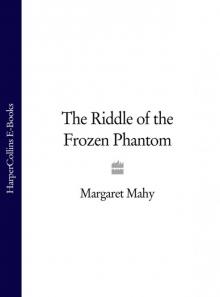 The Riddle of the Frozen Phantom
The Riddle of the Frozen Phantom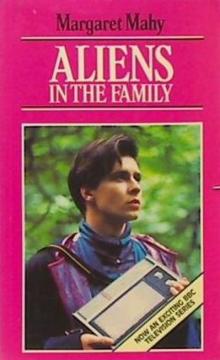 Aliens In The Family
Aliens In The Family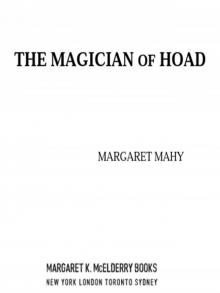 The Magician of Hoad
The Magician of Hoad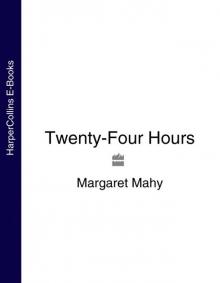 Twenty-Four Hours
Twenty-Four Hours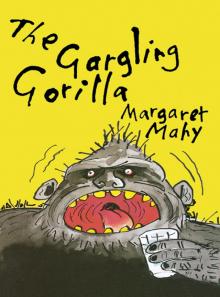 The Gargling Gorilla
The Gargling Gorilla Kaitangata Twitch
Kaitangata Twitch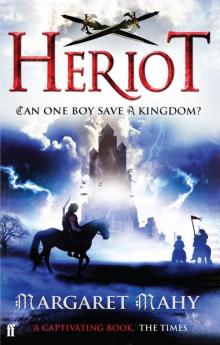 Heriot
Heriot The Changeover
The Changeover